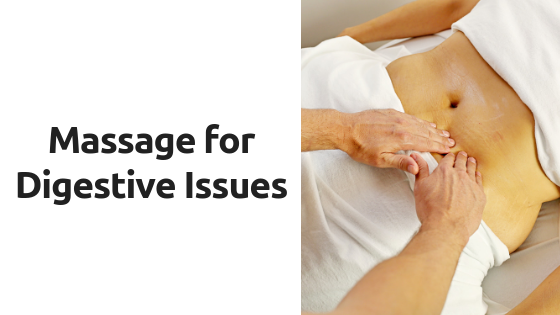As an Amazon Associate, I earn from qualifying purchases.

Digestive problems can be tough to deal with. Not only does it feel uncomfortable, but depending on the symptoms, may be embarrassing. Add that to the frustration of finding a remedy, and no one is very happy when fighting this particular battle. You may have tried over-the-counter or even prescription medications, but there is an alternative that many people don’t consider; massage. Massage of the abdominal area has been shown to improve digestive function.
Studies have shown that not only can massage help restore regularity and decrease associated gas pain, but it can also decrease the time it takes for you to digest your food. When massage is applied throughout the abdomen, it can stimulate a process called peristalsis, which is the rhythmic muscular contractions of the intestines. This is how matter is moved through the digestive tract. By stimulating this process, you’re more likely to remain regular and overcome those bouts of constipation more easily.
If you find that you’re experiencing some irregularity, there are a few things to check off the list first…
Fiber Intake: Having enough fiber is imperative to a healthy digestive system. Fiber helps sweep the walls of your bowels, getting rid of anything hanging on to your intestinal tract; but did you know that having too much fiber can block other waste from making its way through your intestines? Balance is key!
Water Intake: Water is absolutely necessary for proper digestive function. Staying hydrated helps the body function overall, but digestion is greatly reliant on water to allow waste to travel through the digestive tract. If you aren’t getting enough water, that waste isn’t able to move as easily as it should, resulting in constipation. However, if you’re experiencing diarrhea, don’t cut back on your water intake. While you may think that will help, it won’t. You’re losing a lot of water with diarrhea and can easily become dehydrated.
Food allergies: Any time something enters your body that doesn’t belong there, your body will let you know it. Sometimes the body reacts to something seemingly normal as if it were dangerous, letting you clearly know that you shouldn’t eat that again. But it’s not always as serious as swelling of the tongue or throat, like you may associate with food allergies. Instead, it may be a less obvious sign as the gastrointestinal tract slows or stalls digestion in an attempt to protect itself. If you’re experiencing periods of digestive problems, start keeping a food journal to see if there’s any association with certain foods.
Intestinal disorder: When the above are ruled out, you may have a more serious problem like an intestinal disorder. Crohn’s disease, diverticulitis, and irritable bowel syndrome are chronic conditions that directly affect the digestive tract. If you have frequent discomfort, diarrhea, or have a difficult time passing stool for long periods, you’ll definitely want to see a physician.
Abdominal adhesions: These bands of scar tissue that form between abdominal tissues and organs causing them to ‘stick’ together, can also be a culprit in constipation. Adhesions like this can press into and squeeze areas of the intestines. This may be mild or moderate, causing occasional or frequent constipation, or may be severe, causing a complete obstruction which would require surgery.
What You Should & Shouldn’t Do After A Massage(Opens in a new browser tab)
While massage can be greatly beneficial for digestive issues like constipation and gas, if you’re experiencing diarrhea, massage to the abdomen may in fact make your symptoms worse. It’s important to be open with your massage therapist about what symptoms you’re experiencing at the time of your appointment and for the previous 24 hours. We’ll work with you to develop the right treatment plan or refer you to the best specialist to help.




